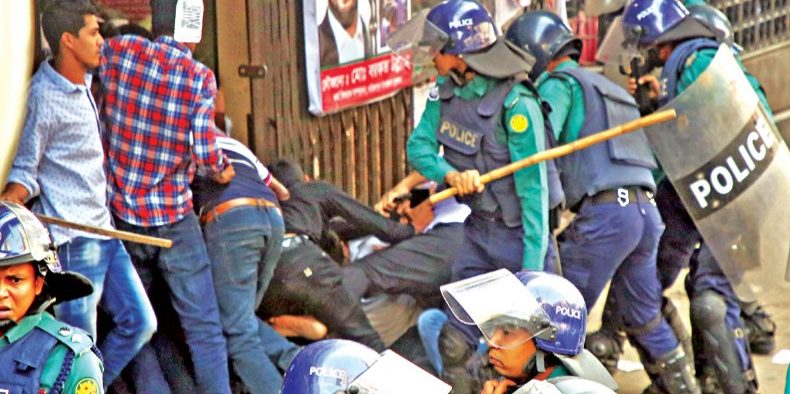Foreign missions in Dhaka informed of recent political situation

Police attack activists of the main opposition Bangladesh Nationalist Party as they try to resist the law enforcers from entering the party’s central office at Naya Paltan in Dhaka triggering a fierce clash that left an activist killed and over hundred injured leading to mass arrest of BNP leaders and activists on Wednesday. — New Age photo
Bangladesh desk: The Ministry of Foreign Affairs has informed all foreign missions and the Office of UN Resident Coordinator in Dhaka about the recent political situation, including the clash between the police and main opposition Bangladesh Nationalist Party activists at Naya Paltan in the city on December 7.
The ministry on Monday issued a letter dispatched to the foreign missions justifying the police actions against the BNP activists to clear the Naya Paltan road on December 7 that killed one and injured scores.
It also explained the subsequent arrests of BNP leaders, including Mirza Fakhrul Alamgir and Mirza Abbas, ahead of the party’s divisional mass rally held on December 10 in Dhaka.
‘Total 49 policemen were injured while trying to neutralise the BNP vandals. One of the policemen was in a critical condition. He was sent to Dhaka Medical College Hospital. In the ensuing clash between the BNP activists and the Law Enforcing Agencies, unfortunately one passerby was killed. However, due to effective measures undertaken by the Police, no major destruction of property took place,’ said the letter.
It said in defiance of lawful and reasonable restrictions imposed by DMP, BNP leaders resorted to vandalism and anarchy.
‘Police later seized 160 sacks of rice from BNP Party Office. According to the Police, cocktails were also found at BNP party office. The circumstantial evidence shows that the actual plan of the BNP was to occupy the street forcefully and unlawfully three days prior to the scheduled public gathering. The rice was brought to feed the activists for three days,’ the letter termed as ‘non-paper on recent political situation in Bangladesh.’











